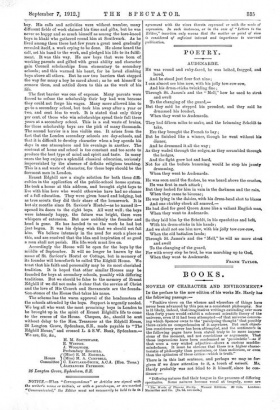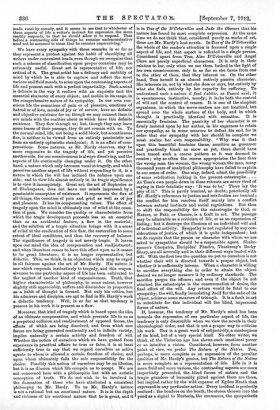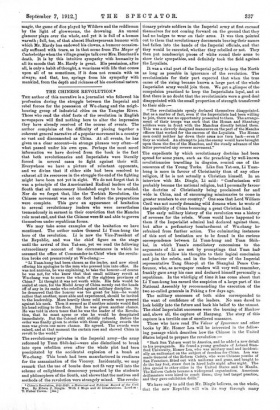BOOKS.
NOVELS OP CHARACTER AND ENVIRONMENT.* IN the preface to the new edition of his works Mr. Hardy has the following passage:— "Positive views on the whence and wherefore of things have never been advanced by this pen as a consistent philosophy. Nor is it likely, indeed, that imaginative writings extending over more than forty years would exhibit a coherent scientific theory of the universe, even if it had been attempted—of that universe concern- ing which Spencer owns to the paralysing thought' that possibly there exists no comprehension of it anywhere. But such object- less consistency never has been attempted, and the sentiments in the following pages have been stated truly to be mere impres- sions of the moment, and not convictions or arguments. these impressions have been condemned as `pessimistic'—as if that were a very wicked adjective—shows a curious muddle- mindedness. It must be obvious that there is a higher charac- teristic of philosophy than pessimism, or than meliorism, or even than the optimism of these critics—which is truth."
There is in this last sentence, and perhaps we may be for- given if we draw attention to it, a touch of naivete. Mr. Hardy probably was not blind to it himself, since he con- tinues :-
"Differing natures find their tongue in the presence of differing spectacles. Some natures become vocal at tragedy, some are
• Th. Works of Thomas Hardy. Wessex Edition. 20 sole. London:. Macmillan and Co. [7s. 6d. net each.]
made vocal by comedy, and it seems to me that to whichever of these aspects of life a writer's instinct for expression the more readily responds, to that he should allow it to respond. That before a contrasting side of things he remains undemonstrative need not be assumed to mean that he remains nnperceiving."
We have every sympathy with these remarks in so far as they represent a protest against the habit of classifying all writers under convenient heads, even though we recognize that such a scheme of classification upon proper occasions may be extremely useful. Great art is representative of life, not critical of it. The great artist has a delicacy and mobility of mind by which he is able to capture and reflect the most various and fluid moods, to seize upon the contrasting aspects of life and present each with a perfect impartiality. Such a mind is delicate in the way it realizes with an exquisite tact the essential character of every object ; and mobile in its range, in the comprehensive nature of its sympathy. In our own con- scious life the sensations of pain or of pleasure, emotions of hatred or of love, moods of joy or of sorrow, have no definite and objective existence for us, though we may connect them in our minds with the realities about us which have this definite existence. They flow through us; but, though they may leave some traces of their passage, they do not remain with us. To the normal mind, life, not being a solid block, but a continuous flux, is neither to be viewed from an entirely pessimistic nor from an entirely optimistic standpoint; it is an affair of com- pensations. Some natures, as Mr. Hardy observes, may be more responsive to the tragedy of life, and yet perceive another side, for our consciousness is always dissolving, and the aspects of life continually changing under it. On the other band, a nature which only becomes vocal at tragedy, and which perceives another aspect of life without responding to it, is a nature in which the will has inclined the balance upon one side ; and to view life almost entirely in its tragic significance is to view it incompletely. Great art, the art of Sophocles or of Shakespeare, does not leave our minds impressed by a pessimistic conception of existence. It represents the flux of all things, the cessation of pain and grief as well as of joy and pleasure. It has its compensating values. The effect of tragedy upon the mind is ultimately one of relief at the cessa- tion of pain. We consider the quality or characteristic from which the tragic development proceeds less as an essential than as an accidental feature, a flaw in the material ; and the solution of a tragic situation brings with it a sense of relief at the eradication of this flaw, the restoration to some extent of ideal conditions, and thus the recovery of balance. The significance of tragedy is not merely tragic. It leaves upon our mind the idea of compensation and readjustment ; and when literature ceases to have this effect upon us it ceases to be great literature ; it is no longer representative, but didactic. This, we think, is an objection which may be urged in all fairness against the art of Mr. Hardy. His nature is one which responds instinctively to tragedy, and this respon- siveness to one particular aspect of life has been cultivated to the neglect of another kind of responsiveness. Truth, that higher characteristic of philosophy, to some extent, however slightly still appreciably, suffers and diminishes in proportion as a habit of thought is formed. Not only his critics, but his admirers and disciples, are apt to find in Mr. Hardy's work a didactic tendency. Well, in so far as that tendency is present in his work it is present as a flaw.
Moreover, that kind of tragedy which is based upon the idea of an ultimate compensation, and which presents life to us as a perpetual collision and readjustment of opposed forces, the effects of which are being dissolved, and from which new forces are being generated continually and in infinite variety, implies naturally a certain activity and freedom of will. Whether the notion of ourselves which we have gained from experience in practical affairs be true or false, it is at least sufficiently true to say that we regard ourselves as active agents to whom is allowed a certain freedom of choice, and upon whom ultimately falls the sole responsibility for the choice. Possibly this notion of ourselves may be an illusion, but it is an illusion which life compels us to accept. We are not concerned here with a philosophic but with an artistic conception of truth. We do not wish to be involved in the damnation of those who have attributed a consistent philosophy to Mr. Hardy. To us Mr. Hardy's nature is not a rational but an emotional nature. It is in the depth and richness of his emotional nature that he is great, and it is in Teas of the D'Urbervilles and Tude the Obscure that his nature has found its most complete expression. At the same time we do not think that, considered purely as works of art, these are Mr. Hardy's best novels. In Tess of the Tr Urbertrilles the whole of the reader's attention is focussed upon a single aspect of life, and that aspect is reflected in a single person. Considered apart from Tess, Alec D'Urberville and Angel Clare are purely superficial characters. It is only in their relation to her, only when we see them bathed in the light of her own consciousness, only in so far as she turns from one to the other of them, that they interest us. On the other hand., Tess herself is an almost entirely passive character. She interests us, not by what she does or says, but entirely by what she feels, entirely by her capacity for suffering. To understand such a nature it feat s'abetir, as Pascal said; it is spontaneous, instinctive, moody; it lacks both the control of will and the control of reason. It is one of the simplest organisms, in which the nerve-centres are not localized, but spread over the whole surface of the body, and in which thought is practically identical with sensation. It is essentially feminine. The passivity of her character is so firmly insisted upon by her author, in his eagerness to retain our sympathy, as in some measure to defeat his end, for in order that our sympathy with her should be complete we must realize her own responsibility. " Why was it that upon this beautiful feminine tissue, sensitive as gossamer and practically blank as snow as yet, there should have been traced such a coarse pattern as it was doomed to receive; why so often the coarse appropriates the finer thus the wrong man the woman, the wrong woman the man, many thousand years of analytical philosophy have failed to explain to our sense of order. One may, indeed, admit the possibility of some retribution lurking in the present catastrophe. . . . As Tess's own people down in those retreats are never tired of saying in their fatalistic way : ` It was to be.' There lay the pity of it." This is partly ironical, no doubt; practically all Mr. Hardy's references to justice and retribution are ironical ; the conflict for him resolves itself mainly into a conflict between natural instincts and social regulations. But thus to shift the responsibility for the catastrophe to God, or Nature, or Fate, or Chance, is a fault in art. The passage may be admirable as a criticism of life, or as an expression of feeling ; but it destroys the illusions of an individual will and of individual activity. Sympathy is not regulated by any con- siderations of justice, of which it is quite independent ; but we do require that the person or character with whom we are asked to sympathize should be a responsible agent. Shake- speare's Cleopatra, Euripides' Phaedra; Thackeray's Becky Sharp, are all severally and in their different ways loaded with will. With the first two the question we put to ourselves is not whether their will is directed towards a proper object, but whether it is sufficiently intense. When a character is willing to sacrifice everything else in order to attain the object desired we no longer measure it by ordinary standards. The sacrifice purges the offence; and even if the object be not attained the catastrophe is the consummation of desire, the final effort of the will. Any return would be fatal to our sympathy; the will, finally immolating itself for the sake of its object, achieves some measure of triumph. It is a fault in art to substitute for this individual will the blind, impersonal forces of nature.
If, however, the tendency of Mr. Hardy's mind has been towards the expression of one particular aspect of life, the tendency is only discernible when we view the novels in their chronological order, and that is not a proper way to criticise his work. Tess is a great work of subjectivity, a masterpiece of its kind, but of a very special kind. No other writer, we think, of the Victorian age has shown such emotional power or so intuitive a vision. Considered, however, from another point of view, we prefer The Return of the Native. Tess, perhaps, is more complete as an expression of the peculiar qualities of Mr. Hardy's genius, but The Return, of the Native is more complete as a representation of life. Life in it is more fluid and more various, the contrasting aspects are more impartially presented, the blind forces of nature and the tragic grandeur of humanity pitted against them are there, but implied rather by the wild expanse of Egdon Heath than expressed in any particular action. Every incident is perfectly realized : the bonfires on the heath, the stones thrown into the pond as a signal to Enstacia, the mummers, the sympathetic
magic, the game of dice played by Wildeve and the reddleman by the light of glowworms, the drowning. An unreal glamour plays over the whole, and yet it is full of a human warmth; full, too, of that almost Shakespearean humour with which Mr. Hardy has endowed his clowns, a humour occasion- ally suffused with tears, as in that scene from The Mayor of Casterbridge when the village gossips talk over Mrs. Henchard's death, It is by this intuitive sympathy with humanity in all its moods that Mr. Hardy is great. His pessimism, after all, is only a habit of thought, a weariness with life that comes upon all of us sometimes, if it does not remain with us always; and that, too, springs from his sympathy with mankind, from the depth and richness of his emotional nature.








































 Previous page
Previous page